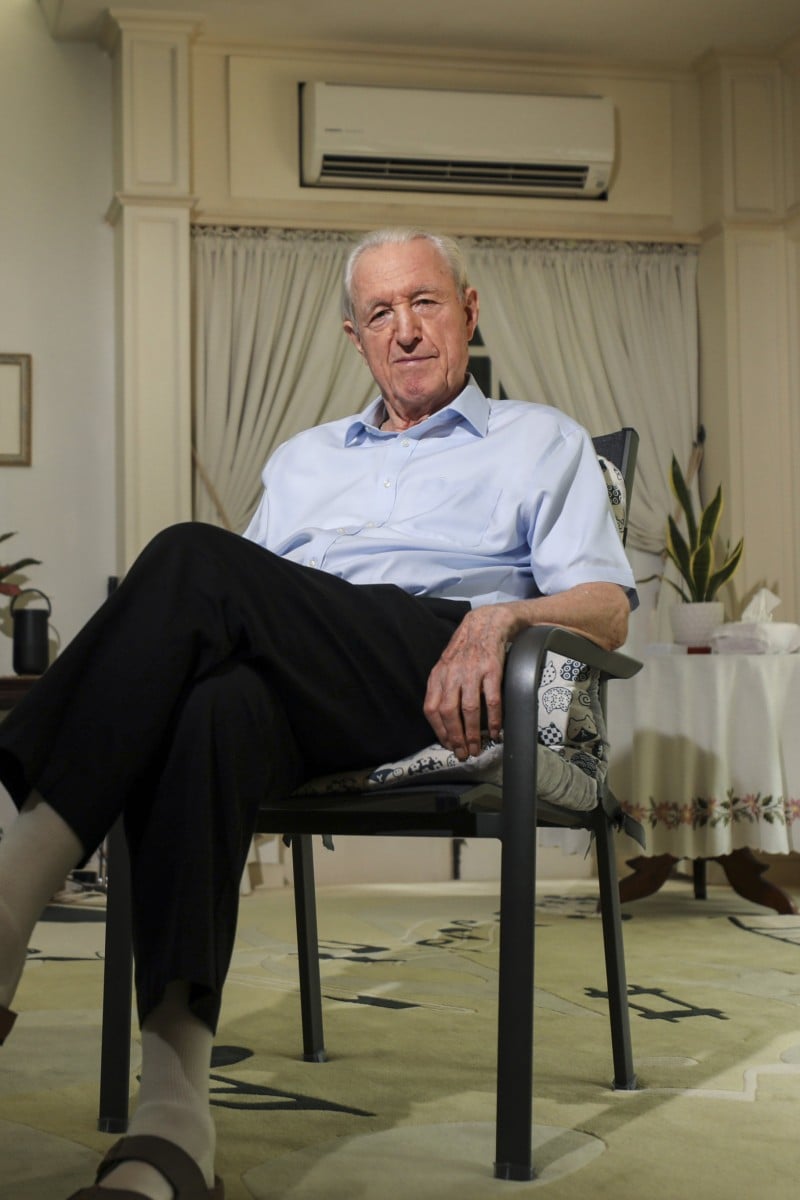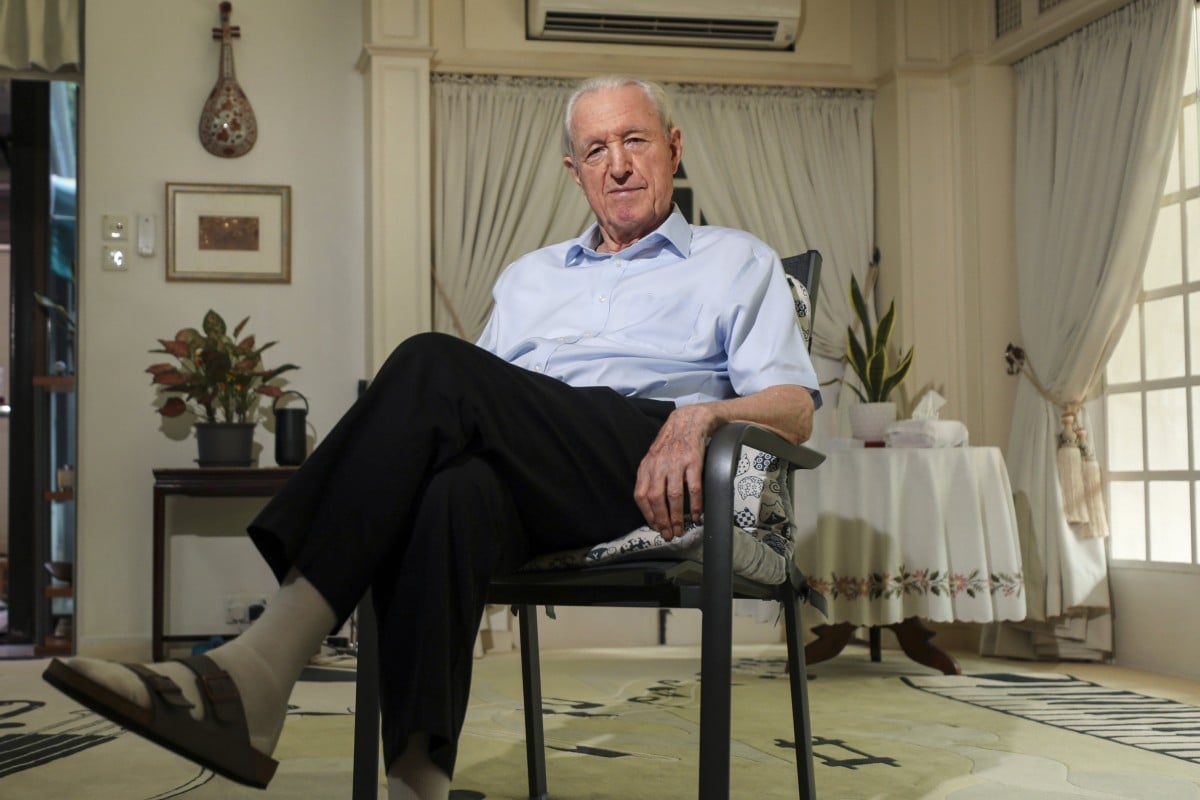
- Born in Germany, the businessman founded Naxos Music Group in 1987, offering affordable CD recordings
- Now, he discusses artificial intelligence’s potential to transform music industry, while pushing human artists to be even more creative
 Klaus Heymann believes artificial intelligence can never replace composers such as Mozart or Beethoven. Photo: Xiaomei Chen
Klaus Heymann believes artificial intelligence can never replace composers such as Mozart or Beethoven. Photo: Xiaomei ChenClassical music has always played a key role in the life of 86-year-old German entrepreneur Klaus Heymann.
At the age of nine, his mother took him to a live orchestra performance, which left a lasting impression on him during a time when rock ‘n’ roll and pop music had yet to emerge.
Decades later, in 1987, the legendary businessman founded Naxos Music Group, a renowned record company that would revolutionise the classical music industry.
With his background as a music lover in Hong Kong, it was a natural progression for Heymann to use technology to transform the music world – by recording classical music onto CDs.
“At that time, the classical music scene in Hong Kong was very little. We only had one concert hall, the City Hall,” Heymann recalled.
The Beatles are releasing their ‘final’ record thanks to AI
His company became a leading force in providing everyday people with a wide range of affordable CDs and expanding access to the world of classical music.
Now, nearly 30 years since Naxos began, the world is set to see another wave of change with the emergence of artificial intelligence (AI) – and Heymann anticipates AI will lead to big shifts in the music industry.
“Artificial intelligence can facilitate search – the tool can go through our huge catalogue and identify all the music you want to find,” he explained.
In composition, he sees AI’s potential to craft background music for settings such as video games or shopping malls, where technicality or expressiveness in the tune may be less critical.
“A very good business has been relaxing piano music that makes people asleep. That music is already written by AI,” he said.
Despite AI’s advances in music, Heymann emphasises that human composers will continue to provide unique inspiration that resonates with audiences.
In the future, there might be two streams of music: one created by AI, while the other is marked as created by humans, he said. The entrepreneur said the latter would become more invaluable as he firmly believed AI could never replace the genius composers in human history.
“I don’t think AI can replace Mozart and Beethoven,” he noted, adding that human artists must strive to craft innovative ideas to compete with AI-generated music.
“Artificial intelligence can create a piece that sounds like Mozart, but it cannot invent these wonderful immortal melodies.”
Making his music kingdom
Born in Frankfurt, Germany, right before the start of World War II, Heymann had an expansive journey before establishing his music company.
After university, he began his career at an American newspaper, The Overseas Weekly, in Frankfurt. In 1967, he ventured to Hong Kong to start an office for the paper.
After two years with this newspaper in Hong Kong, Heymann started a mail-order business, shipping cameras to US soldiers in Vietnam. When the war there ended, Heymann became the Hong Kong distributor for Bose and ReVox, two audio equipment companies. To boost sales and cultivate music appreciation, he also began organising classical music concerts in Hong Kong City Hall.
In 1986, as the manufacturing costs of CDs declined, Heymann saw an opportunity to introduce an affordable CD label. At the time, his CDs were priced at around HK$50, offering a more accessible option compared to others that were priced over HK$100.
The business flourished and his music empire turned him into a millionaire.
Even as CD sales declined amid the rise of online streaming, Naxos adapted to the changing landscape. Heymann steered Naxos towards embracing online platforms, establishing the Naxos Music Library, which provides a digital resource for educational institutions, as well as the Naxos MusicBox, offering educational content about classical music for younger kids.
The company’s focus shifted from selling CDs to streaming as the primary source of revenue. Heymann has also used YouTube as a promotional tool, with the Naxos channel attracting 30,000 subscribers.
Resonating with young people
In a time when teens are drawn to pop songs and other genres, Heymann is on a quest to help younger audiences resonate with classical music.
He advocates for a more relaxed and less formal atmosphere in music concerts to allow audience participation and expression of emotions.
“When young people go to concerts, they want to have company, they want to have action, and they want to express their feelings,” he pointed out.
“The problem we have is the format of the classical concert is outdated. It’s too formal and too stiff.”
Virtual AI singer enrols at Shanghai Conservatory of Music
He sees the integration of classical music into film and video game soundtracks as a gateway for introducing it to younger generations.
“That is actually a door opener of classical music for kids,” he said, adding that Naxos had been licensing its recordings to film and television producers to increase the exposure of classical music in popular media.
Heymann also hoped to collaborate with more young musicians in Hong Kong and advocate for more affordable venues for music recordings.
He advises aspiring young musicians to diversify their skills and learn various aspects of the industry, including music video production and how to attract subscribers.
“My advice is always to learn as many other things as possible,” he said, hoping that classical music would continue to inspire a new generation.
Progression 進展
the process of moving forward or advancing
Emergence 嶄露頭角
when something comes out or becomes visible or known
Expressiveness 表現力
the quality of effectively communicating a thought or feeling
Invaluable 寶貴的
describes something that is extremely valuable or precious
Expansive 廣闊的
describes something covers a wide area in space or scope
Distributor 發行人
a person or company that delivers or supplies something to different places or people
Resonate 引起共鳴
to create a strong or meaningful connection or feeling with someone